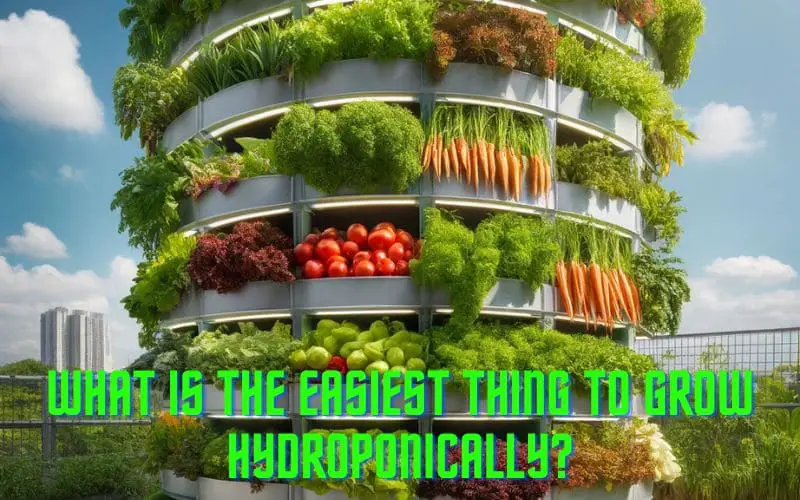What Is The Easiest Thing To Grow Hydroponically? Intro Tips

Introduction
Hydroponic gardening has gained popularity due to its efficiency and minimal space requirements, making it an ideal solution for modern plant cultivation. Let’s embark on this enlightening journey into the world of soilless agriculture.
Answer to the Question
The easiest plants to grow hydroponically are leafy greens and herbs, such as lettuce, kale, spinach, and basil. These plants thrive in hydroponic systems due to their shallow root systems and adaptability to soilless cultivation.
Benefits of Hydroponic Gardening
Easy Maintenance
Hydroponic gardening offers easy maintenance as it eliminates the need for regular watering and weeding. The controlled environment and nutrient solution ensure the consistent growth of plants, reducing the time and effort required for upkeep.
Fast Growth
Plants grown hydroponically experience accelerated growth rates compared to traditional soil cultivation. The direct access to essential nutrients and oxygen promotes rapid development, resulting in higher yields in a shorter time frame.
Water Conservation
Hydroponic gardening is a water-efficient method as it recirculates water within the system, minimizing wastage and promoting sustainable resource management. This conservation approach aligns with environmental sustainability goals while supporting healthy plant growth.
- Reduced Water Usage: Hydroponic systems use up to 90% less water compared to traditional soil gardening, making it a highly efficient method for water conservation.
- Sustainable Resources: By reusing and recirculating water, hydroponic gardening minimizes the depletion of freshwater resources, contributing to sustainable water management.
- Environmental Benefits: Water conservation in hydroponics reduces the environmental impact by minimizing the use of water and reducing the potential for water pollution from excessive runoff.
Hydroponic systems employ various water conservation techniques, including:
- Recirculating Water: The closed-loop system of hydroponics allows for the recirculation of water, ensuring minimal wastage and efficient use of resources.
- Water-Efficient Nutrient Delivery: By delivering nutrients directly to the plant roots, hydroponic systems optimize nutrient uptake and reduce water loss through seepage and runoff.
- Monitoring and Control: Advanced hydroponic setups integrate monitoring systems to track water usage and ensure precise control, minimizing unnecessary water consumption.
Best Plants for Hydroponic Growth
Herbs and Leafy Greens
Herbs and leafy greens, including basil, spinach, lettuce, and kale, are among the best plants for hydroponic growth. Their shallow root systems and rapid growth make them well-suited for soilless cultivation, ensuring bountiful harvests and culinary delight.
- Basil: Basil is a versatile herb that adds a delightful aroma and flavor to various dishes. It thrives in hydroponic systems, making it an excellent choice for home gardens.
- Spinach: Spinach is packed with nutrients and is a popular choice for hydroponic cultivation due to its fast growth and ability to thrive in a controlled environment.
- Lettuce: From crisp romaine to delicate butterhead, lettuce varieties excel in hydroponic setups, offering a continuous supply of fresh, vibrant greens.
- Kale: Known for its robust flavor and nutritional benefits, kale is an ideal hydroponic crop that can thrive in nutrient-rich, oxygenated water.
When cultivating herbs and leafy greens hydroponically, it’s important to maintain optimal nutrient levels, light exposure, and humidity to support healthy growth and yield. With proper care, these plants will flourish and provide an abundance of fresh, flavorful ingredients for your culinary creations.
Tomatoes and Peppers
Tomatoes and peppers are versatile and popular choices for hydroponic systems. Their ability to thrive in a controlled environment leads to exceptional yields and flavorful produce. Here’s a detailed look at the key aspects of growing tomatoes and peppers hydroponically:
- Optimal Nutrient Solution: Tomatoes and peppers need a well-balanced nutrient solution to support their growth. The solution should include essential elements such as nitrogen, phosphorous, potassium, and calcium, tailored to the specific needs of these plants.
- Environmental Conditions: Maintaining the right temperature, humidity, and lighting is crucial for the successful growth of tomatoes and peppers in hydroponic systems. Adequate air circulation and ventilation are also vital to prevent diseases and ensure healthy development.
- Pruning and Training: Regular pruning and training of the plants are essential to encourage robust growth and optimize the production of fruits. This includes removing suckers on tomato plants and providing appropriate support for pepper plants as they mature.
- Blossom End Rot Prevention: Tomatoes are susceptible to blossom end rot, a common disorder caused by a calcium deficiency. Implementing measures such as maintaining proper pH levels and adequate calcium availability can help prevent this issue.
Cucumbers and Zucchinis
Cucumbers and zucchinis are excellent choices for hydroponic cultivation. Their versatility and nutritional value make them popular among hydroponic growers. Let’s delve deeper into the benefits and techniques for growing cucumbers and zucchinis hydroponically.
- Optimal Nutrient Supply: Hydroponic systems provide precise and regulated nutrient solutions, ensuring that cucumbers and zucchinis receive the essential elements for robust growth.
- Water Efficiency: Hydroponic cultivation conserves water by circulating nutrient solutions, minimizing waste and maximizing the hydration of plants.
- Space Utilization: The vertical growth habit of cucumbers and zucchinis in hydroponic systems allows efficient use of space, making them suitable for indoor and urban farming.
When growing cucumbers and zucchinis hydroponically, it’s crucial to consider the following techniques:
- Substrate Selection: Choosing the right growing medium such as perlite, coconut coir, or rockwool can significantly impact the growth and yield of cucumbers and zucchinis in a hydroponic setup.
- Temperature and Humidity Control: Maintaining optimal environmental conditions, including temperature and humidity levels, is essential for the healthy development of cucumbers and zucchinis in hydroponic systems.
- Pollination Strategies: In the absence of natural pollinators, implementing hand pollination techniques ensures successful fruit set in cucumbers and zucchinis grown hydroponically.
Conclusion
In conclusion, hydroponic gardening offers a multitude of benefits that make it an attractive option for both beginners and experienced gardeners. Let’s summarize the key points:
- Easy Maintenance: With hydroponic systems, the need for regular watering and weeding is significantly reduced, making it a low-maintenance gardening method.
- Fast Growth: The controlled environment of hydroponic systems accelerates plant growth, resulting in quicker harvests compared to traditional soil gardening.
- Water Conservation: Hydroponic gardening uses water more efficiently than soil-based gardening, making it an eco-friendly choice for water-conscious individuals.
Furthermore, the versatility of hydroponic gardening extends to the wide variety of plants that thrive in this environment. From herbs and leafy greens to tomatoes, peppers, cucumbers, and zucchinis, the options for cultivation are extensive. Whether you’re looking to grow a small kitchen garden or embark on commercial hydroponic farming, the possibilities are abundant.
By embracing hydroponic gardening, individuals can reap the benefits of fresh, nutritious produce while contributing to sustainable and resource-efficient agricultural practices. It’s an innovative and rewarding approach to gardening that continues to gain popularity for all the right reasons.
